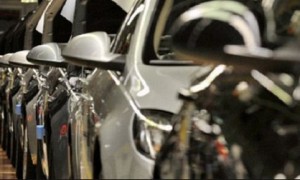 The roles played by global automakers are continuing to shift in two core areas: what products and services will be delivered and how vehicles will be manufactured. A new study by Navigant Research and revised supply chain sustainability standards agreed upon by leading automakers illustrate the evolving automotive marketplace and the role clean transportation standards will play. As previously mentioned, the identity of automakers is changing from vehicle builders to transportation service providers.
The roles played by global automakers are continuing to shift in two core areas: what products and services will be delivered and how vehicles will be manufactured. A new study by Navigant Research and revised supply chain sustainability standards agreed upon by leading automakers illustrate the evolving automotive marketplace and the role clean transportation standards will play. As previously mentioned, the identity of automakers is changing from vehicle builders to transportation service providers.
Navigant Research’s new report, “Alternative Revenue Streams for Automakers,” analyzes the push toward a more sustainable transportation system that’s coming through plug-in electric vehicles (PEVs), vehicle-to-grid, vehicle-to-building, home energy management, solar energy, charging, carsharing, and smart parking services. Now that PEVs have been adopted by thousands of consumers, automakers are seeing more opportunities to play a role in home electricity networks, workplaces, and commercial locations that need integration of charging services. Automakers in North America, Europe, and Japan face stringent fuel economy and emissions reduction targets – and mature markets where new vehicle sales are starting to flatten out. Playing an expanded role in sustainability transportation meets their need for additional revenue streams and complying with government mandates.
Another factor behind these trends are growing concerns about increasing urbanization that will lead to increased traffic congestion and air pollution. Greater restrictions on vehicle use are being seen in London, New York, Beijing, Tokyo, and other major cities. Automakers such as BMW are creatively testing out new programs to address urbanization that include carsharing, smart parking, and charging locations connected to mobile devices. The main challenge automakers face is lacking the expertise and experience to move forward in new areas such as home energy management or vehicle-to-grid – so partnerships with suppliers with expertise in these new systems are being tested out.
These alternatives will not replace the manufacturing and marketing of new vehicles, but are expected to generate more than $1 billion in revenue for the auto industry by 2018, according to the report. Carsharing services will play a large part in this revenue, followed by vehicle-to-grid.
Fourteen major automakers have just agreed to the “Automotive Industry Guiding Principles to Enhance Sustainability Performance in the Supply Chain.” Two leading corporate responsibility business associations, AIAG and CSR Europe, have expanded automaker membership for suggested principles for supplier relationships based on sustainability standards that were first adopted in 2009. Now, participants include BMW, Chrysler, Daimler, Fiat, Ford, General Motors, Honda, Jaguar/Land Rover, PSA Peugeot Citroen, Scania, Toyota, Volkswagen, Volvo Cars, and Volvo Group.
This set of broad principles for suppliers addresses environmental issues, working conditions, human rights, and business ethics. The guidelines apply to first-tier suppliers as well as their subcontractors and suppliers. Affected business practices in the new standards include: reducing greenhouse gas emissions, energy, and water consumption; increasing use of renewable energies; improving waste management; and training of employees.
The list of global automaker that have signed on to these standards is missing some of the major companies such as Nissan Renault, Hyundai Kia, Subaru, and Chinese automakers. Yet, it is a significant announcement illustrating, along with the Navigant Research report, how different the auto industry is becoming compared to 10 years ago.



